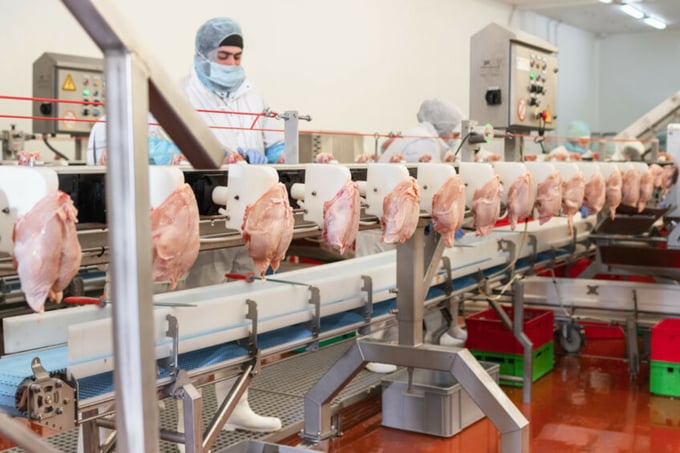November 20, 2025 | 10:12 GMT +7
November 20, 2025 | 10:12 GMT +7
Hotline: 0913.378.918
November 20, 2025 | 10:12 GMT +7
Hotline: 0913.378.918

It is reported that without illegal workers, US poultry processing companies will have to raise wages to attract American workers and/or further automate. Photo: Canva.
According to Wired Magazine, “around 23% of workers in the meatpacking industry are undocumented and 42% are foreign-born.”
As noted recently by a city council member in Fremont, Nebraska, named Paul von Behren, “the primary draw [for hiring illegal workers] is the cheap labour they provide. They’re basically less educated and less skilled than the average American worker. We’re primarily a meat processing town, so by and large our businesses like to have them here.”
It is difficult to find Americans to take on processing jobs at present wages due to the physically-taxing and potentially dangerous nature of the work during shifts of 8 hours or more in cold temperatures.
Still, as noted by many new articles, including one in the media outlet Stateline, “if President-elect Donald Trump follows through on his pledge to deport millions of immigrants, it could upend the economies of states where farming and other food-related industries are crucial.”
Labour shortages already widespread
In poultry processing, pig farming, dairy farming and many other ag-related contexts, labour shortages are already common in the US and other countries. Indeed, the shortages in poultry processing are severe. About 58% of these workers quit their jobs within 90 days and another 28% quit between 90 days and 180 days.
Automation firm Meyn reports that “absenteeism and high turnover are estimated to add 4% to processing costs. And at the same time the poultry business is growing rapidly due to increasing worldwide demand for protein and the success of poultry as a protein source.”
Higher costs coming
Without illegal workers, US poultry processing companies will have to raise wages to attract American workers and/or further automate. Many options for automating exist in each part of the handling, slaughter and meat processing operation. There is also the option to rapidly legalise many thousands of sector workers.
Regarding the challenges ahead, Wired Magazine reports that during a recent Tyson Foods earnings call, CEO Donnie King was calm. “There’s a lot that we don’t know at this point,” he stated to shareholders, “but I would remind you that we’ve successfully operated this business for over 90 years, no matter the party in control.”
(PW)

(VAN) Flagship partnership secures additional GBP 16.9 million to strengthen forest monitoring, transparency and country support to 2030.

(VAN) After a turbulent year for international development, the aid and assistance landscape has shifted, with donors rethinking how, where and why they support sustainable development.

(VAN) A new tool for measuring the economic value of farm animal welfare improvements has been developed, potentially transforming how consumers, retailers and the government evaluate animal welfare policies.

(VAN) The Amazon rainforest could face a renewed surge of deforestation as efforts grow to overturn a long-standing ban that has protected it.

(VAN) Conflict and violence are driving extreme hunger in six major crises.

(VAN) European Union member states are seeking to postpone the implementation of the bloc's anti-deforestation law by another year, an EU negotiating draft dated November 10 shows.

(VAN) Nearly 30 new avian influenza outbreaks have recently been reported in Germany, both on commercial poultry farms and in backyard flocks.